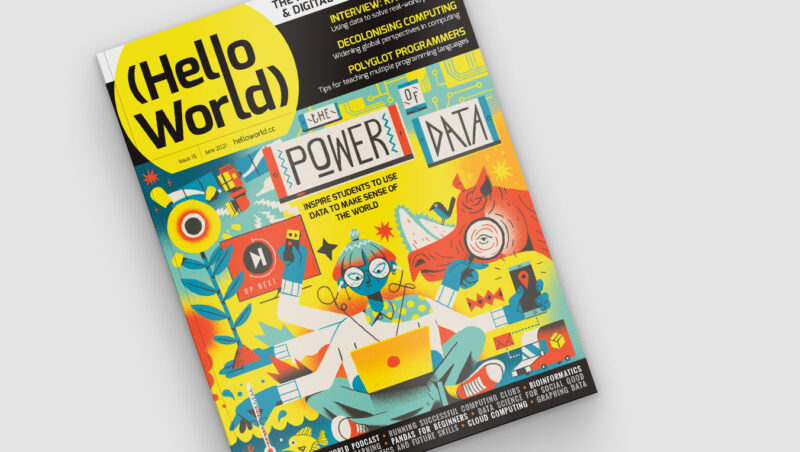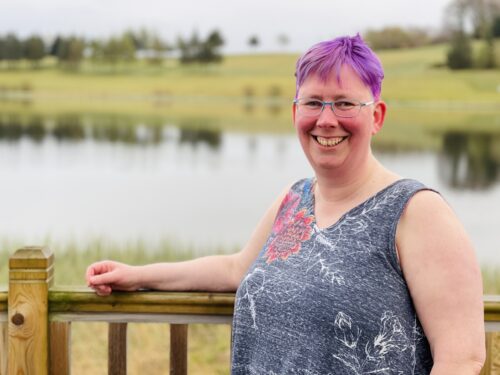In our brand-new issue of Hello World magazine, editor Gemma Coleman speaks to Kate Farrell from Data Education in Schools to discuss the importance of teaching data to help students navigate the world.

When I was searching for contributors for this issue of Hello World, a pattern quickly began to emerge: “Data? You want to speak to Kate.” Kate Farrell is director of curriculum development and professional learning on the Data Education in Schools project, part of the Data-Driven Innovation Skills Gateway in Scotland. With the project developing teaching materials, professional development, and even qualifications for schools that want to teach data education to learners aged 3–18, “It’s not the kind of role that fits easily on a business card,” she laughs.

The project started in 2019, with the team looking at the Scottish curriculum and mapping out where data could be embedded and how it could be used to support various subjects. “We know that teachers are under stress and won’t be able to deliver extra stuff, so we’re looking to understand how we get better at doing data literacy within the rest of the curriculum,” Kate explains. “How do we provide and support opportunities to look at data in the rest of the curriculum in cool new ways?”
“We like taking topics that you wouldn’t instantly think are about data science.”
The team runs monthly seminars drawing upon this theme, to help teachers see its applicability across all subjects. “We like taking topics that you wouldn’t instantly think are about data science. Yes, the sciences, computer science, and maths are where you would expect it, but there are huge amounts of data and data use in geography, music, social studies, and even PE.”
One example is the DataFit series of lessons for upper primary and lower secondary students, with a mission to simultaneously increase data literacy and physical activity literacy. This includes an introduction to activity-monitoring devices, such as step counters on phones. The lesson has the twin aims of teaching students how monitoring steps or sleep activity can be a positive thing, and also encouraging them to reflect on how they feel about their phone collecting their personal data.
“A lot of students don’t realise their phone is keeping track of their step count, just by virtue of it sitting in their pockets,” Kate muses. “It’s been interesting to see just how little some learners know about the data that’s being kept and tracked about them.”
Data Education in Schools ran a similarly themed workshop for students aged 10–11, with a series of events in an imagined Data Town being examined, to investigate how data can impact our lives. The day started by giving each student a cardboard mobile phone on which they could install apps in the form of stickers if they gave the town certain pieces of information about themselves, such as their favourite colour or football team. “Some kids would just install anything, give up any data, because they wanted the stickers – just like many kids will just download any app,” Kate explains. The apps and associated products then developed as they gathered more data, which was then presented back to the students. The purpose was to get students to reflect on how they felt about the products and how they used their data.
“[…] a series of ‘aha’ moments for students, as they realised what sharing their data meant.”
Later in the workshop, the mayor of Data Town announced that the town had sold the data to an advertising company who wanted to know people’s favourite colour, and to a gym who wanted to know their fitness data to help them decide the location of a new branch. “This meant a series of ‘aha’ moments for students, as they realised what sharing their data meant. Some of the kids who had opted not to collect the stickers were suddenly very smug!”
The project keeps a balance in the story it tells about data, with teaching materials encompassing both the risks of data collection and the huge benefits it can bring. “That is our main aim: how can we help learners use data to make their lives and the lives of their communities better — data for social good.” In the Data Town workshop, students also chose to share data with hospitals and researchers, and later found that this had helped them to develop new medicines. “We didn’t just want to send across the message that sharing data is bad. Yes, you can share your data, but be aware who you’re sharing it with, who you’re trusting with it.”
“How can we help learners use data to make their lives and the lives of their communities better?”
- Werbung -
The materials that Data Education in Schools has produced use a framework called PPDAC: Problem, Plan, Data, Analysis, and Conclusion. This is an established approach to statistical literacy, and using this data problem-solving cycle in a real-world context is a powerful way to engage learners with data topics. “The aim is to empower students with the tools to be campaigning, to be making real-world changes to their lives and their communities using data.”
Kate gives a simple example of how a class could look at how much plastic their canteen is using, collecting the data on plastic products and then using that data to make the case to reduce their plastic consumption.
The project has also worked with Scottish exam board SQA to develop a National Progression Award in Data Science; they believe it is the world’s first data science school qualification. The award is aimed at upper secondary students, colleges, and workplaces as an introductory qualification in data science. It carries the same ethos as their materials for younger learners: to help students understand how data is used in society, both negatively and positively, and develop skills to help them make better decisions.
“We need learners to be able to look at the news, and their social media stream, and question what they’re looking at, or ask: where is the evidence?”
“I want people to realise that although data science sounds scary, it’s so important to learners’ lives these days. We’ve seen it with the pandemic. Being able to interpret and analyse data is hugely important. We need learners to be able to look at the news, and their social media stream, and question what they’re looking at, or ask: where is the evidence? This is so important, whether or not they go on to become a data scientist… although we’d love it if they did!”
Subscribe to Hello World for free
Issue 16 of Hello World focuses on data science and data literacy; it is full of teaching ideas and inspiration to help you and your students use data to make decisions and to make sense of the world. Also in this issue:
- Key digital skills for young people with SEND
- Top tips and case studies on how to run a successful computing club
- Reflections on decolonising the computing curriculum
- And more
Subscribe now to get each new digital issue straight to your inbox! And if you’re based in the UK and do paid or unpaid work in education, you can subscribe for free print issues.
PS Have you listened to our Hello World podcast yet? Episode 4 has just come out, and it’s great! Listen and subscribe wherever you get your podcasts.
Website: LINK

